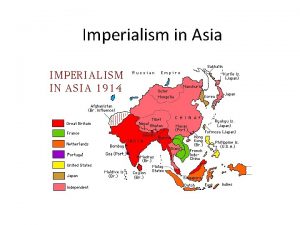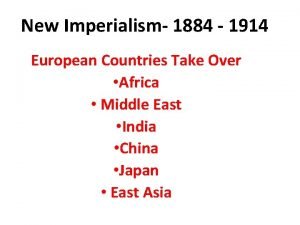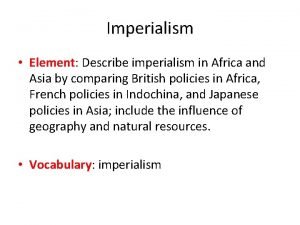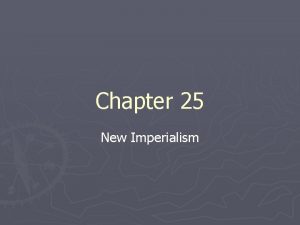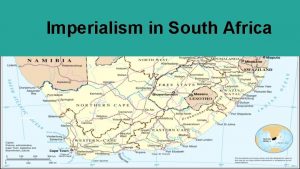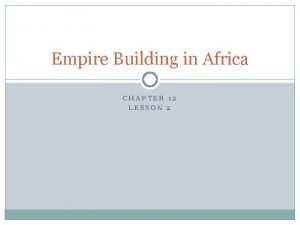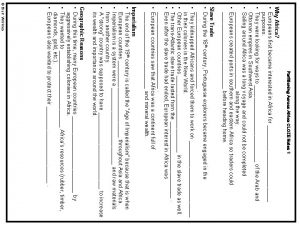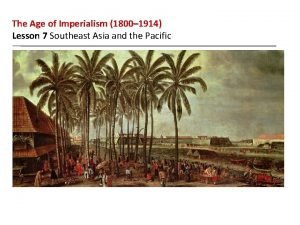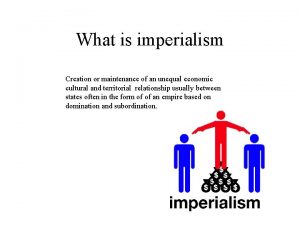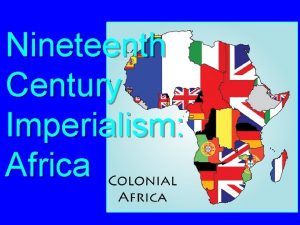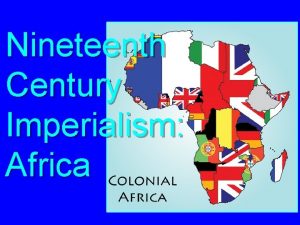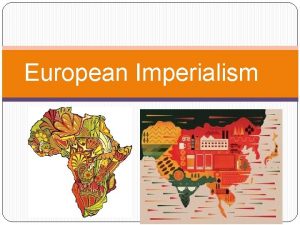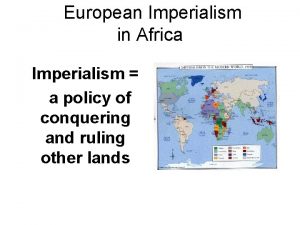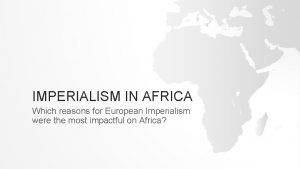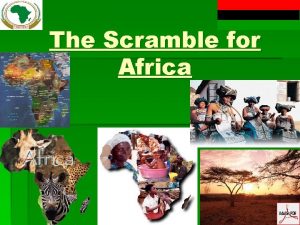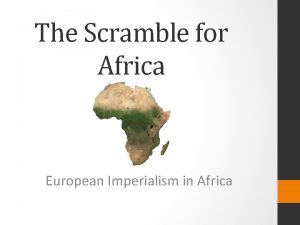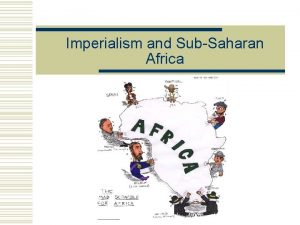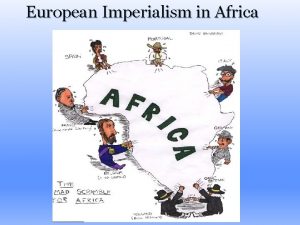European Imperialism in Africa Unit 1 Africa Imperialism































- Slides: 31

European Imperialism in Africa Unit 1 - Africa

Imperialism ► Domination by a country of the political, economic, or cultural life of another country or region.

Source for Raw Materials Industrial Revolution Markets for Finished Goods European Nationalism Missionary Activity European Motives For Colonization Military & Naval Bases Social Darwinism European Racism “White Man’s Burden” Humanitarian Reasons Soc. & Eco. Opportunities

Motives ► Economic ► By late 1800 s, Europe had industrialized ► Needed Africa for its raw materials. § Palm oil, rubber, ivory. ► Markets to sell goods

Motives ► Political ► Wanted to claim land to boost their power in the world; nationalism. ► Navy’s needed bases around the world.

Motives ► Religious ► Missionary Work ► Wanted to spread Western religion (Christianity) ► Believed it was superior § Some set up health care and schools ► Kipling’s “White Man’s Burden”

Motives ► European Racism ► Racial superiority to non-westerners ► Social Darwinism § “Survival of the fittest”

Exploration ► Until 1800 s, Europeans relied on Tribal leaders for slaves. ► Did not explore on their own ► During the 19 th century, they began to search for the source of the African rivers. John Speke: The Source of the Nile

Missionaries ► Religious figures sincere in efforts ► Nonetheless, still viewed Africans as “children” in need of guidance.

Dr. David Livingstone ► Missionary; Traveled the continent for 30 years. ► Wrote about experiences, paved way for other explorers. ► Found by Henry Stanley in 1871.

European Explorers in Africa

“Scramble for Africa” ► King Leopold II of Belgium colonized the Congo River Basin. ► Set off chain reaction in Europe

Berlin Conference ► To avoid war, European powers set up meeting in Berlin, Germany. ► No Africans invited ► Results § Free trade on major rivers § Must set up govt. office ►Officials would exert power over tribe leaders.

Berlin Conference Or another point of view?

Results of Berlin Conference ► 20 years after, almost entire continent was colonized § France controlled large part ► No understanding of tradition or geography § “We have been engaged in drawing lines upon maps where no white man’s foot has ever trod. ”

European Colonization/Decolonization Patterns Berlin Conference of 1884 -85

Horrors of the Congo Leopold exploited resources of Congo § Rubber, ivory, copper ► Belgian overseers tortured African workers § Hands and ears amputated § Population decline in some areas ► Leopold had to turn colony 5 -8 Million Victims (50% of Pop. ) over to Belgian govt. ►

Carving Up a Continent ► France took large part of North Africa § Cost French and Algerian lives ► Britain had heavily populated areas. ► “The sun never sets on the British Empire” ► New Imperialism: Aggressive expansion by European nations from 1870 -1914.

Types of Colonial Rule ► Direct Rule – European nations governed colonies at all levels ► Indirect Rule – Traditional rulers were not replaced as long as they cooperated with European powers; much cheaper.

Cecil Rhodes “The Colossus of Rhodes”

Struggle for South Africa ► Migrating ► Zulu people Tribe ► Shaka; King of Zulu Nation § New weapons and war technology

The Boer War ► Boers, Dutch farmers, moved north due to resentment of British ► Found gold and diamonds in the Boer Republics ► British wanted to control area ► 1899 – 1902; British won, heavy casualties. Raw Diamonds

Boer War The British The Boers

African Resistance Met across the continent ► Algeria = France ► Successful Resistance § Ethiopia § Christian Kingdom in East Africa ► Menelik II; Leader ► “Westernized” civilization ► Ready when Italy tried to invade in 1896 § Ethiopia and Liberia only nations to maintain independence. ►

Why Did Europe Succeed? ► Tribal Wars in West Africa and decline of empires weakened older civilizations. ► 2 Inventions 1. Medicine to cure disease (malaria, yellow fever) 2. “Whatever happens, we have got…the Maxim gun, and they have not. ”

Impacts ► Positive ► Western educated African elite emerged ► Admired West, rejected own culture ► By 1900 s, African leaders forged nationalist movements to pursue independence. § Normally the elite.

Effects ► Positve ► Roads, railroads, better transportation ► Education ► Medical Care ► New agriculture methods ► Local warfare among Africans ended

Effects ► Negative ► Europeans rejected African Tradition ► African rejected traditional rulers ► Close-knit villages split up due to displacement of work ► Negative view on African tradition.

Changes in Africa ► Cash Crop plantations set up ► Europeans introduced money economy instead of trade ► Cash Crops instead of subsistence farming

Colonial Legacy ► Europeans left behind anti-colonialism legacy ► Did not prepare Africans for independence § Few experienced leaders ► Boundaries were artificial creations.

Colonization
 The driving force behind european imperialism in africa
The driving force behind european imperialism in africa Scramble for africa webquest
Scramble for africa webquest Legacy of imperialism
Legacy of imperialism Africa 1890
Africa 1890 Old imperialism motives
Old imperialism motives Asian imperialism
Asian imperialism Imperialize synonym
Imperialize synonym New imperialism africa
New imperialism africa New imperialism africa
New imperialism africa Imperialism in africa berlin conference
Imperialism in africa berlin conference Describe imperialism in africa
Describe imperialism in africa New imperialism africa
New imperialism africa Africa imperialism timeline
Africa imperialism timeline Empire building in africa summary
Empire building in africa summary Africa geography cloze notes 1
Africa geography cloze notes 1 European partitioning
European partitioning European partitioning across africa
European partitioning across africa Unit 6 review questions
Unit 6 review questions Contrast siam’s fate to that of burma and vietnam
Contrast siam’s fate to that of burma and vietnam Africa geography unit test study guide
Africa geography unit test study guide Africa geography unit test study guide
Africa geography unit test study guide Africa unit test
Africa unit test Metode pembiayaan semi langsung
Metode pembiayaan semi langsung Hyp opp adj triangle
Hyp opp adj triangle Si vs english units
Si vs english units Unit 1 test algebra 2 answers
Unit 1 test algebra 2 answers Perhitungan unit cost rekam medis
Perhitungan unit cost rekam medis Unit process and unit operation
Unit process and unit operation What is unit operation and unit process
What is unit operation and unit process Setiap unit akuntansi dianggap sebagai unit yang mandiri
Setiap unit akuntansi dianggap sebagai unit yang mandiri Cause of colonialism
Cause of colonialism Imperialism defintion
Imperialism defintion





